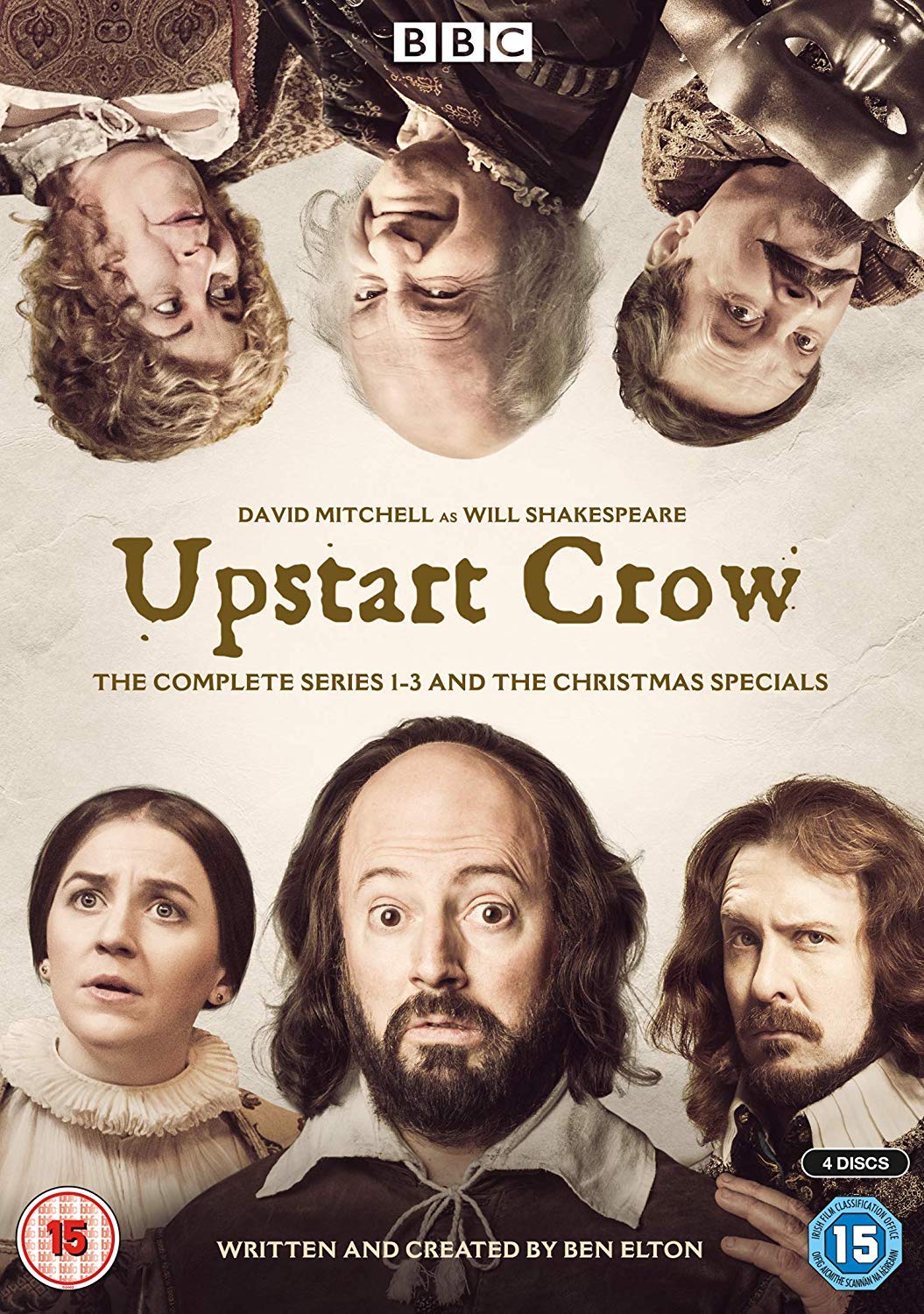 “Star Crossed Lovers.” By Ben Elton. Perf. David Mitchell, Liza Tarbuck, Paula Wilcox, Helen Monks, Harry Enfield, Gemma Whelan, Rob Rouse, Mark Heap, Dominic Coleman, Steve Speirs, and Spencer Jones. Dir. Matt Lipsey. Upstart Crow. Season 1, episode 1. ABC. 9 May 2016. DVD. Paramount, 2007.
“Star Crossed Lovers.” By Ben Elton. Perf. David Mitchell, Liza Tarbuck, Paula Wilcox, Helen Monks, Harry Enfield, Gemma Whelan, Rob Rouse, Mark Heap, Dominic Coleman, Steve Speirs, and Spencer Jones. Dir. Matt Lipsey. Upstart Crow. Season 1, episode 1. ABC. 9 May 2016. DVD. Paramount, 2007.
Alert reader and Shakespeare-related novel writer Jean Hegland (for whom,
q.v.) pointed me toward
Upstart Crow, a sit-com in the old style, complete with either live studio audience or a laugh track.
And it's brilliant.
The show is about Shakespeare trying to make a name for himself as a playwright. We're most often either in his house in Stratford or in his London lodgings. The scheme is for each episode to include a real-life event drawn from Shakespeare's fictional drama. For example, Shakespeare gets into debt to Robert Greene, with whom he's signed a "pound of flesh" agreement. Or he needs a potion to make it appear that someone is dead. Those episodes usually conclude with Anne telling Will that he should put something like that in the play he's working on—but Shakespeare usually discounts the idea, arguing that it would be too unbelievable.
I'm supremely pleased by David Mitchell's Will Shakespeare. He plays the character somewhere between Peter Bowles' Richard DeVere in
To the Manor Born and
Fawlty Towers' very own Basil Fawlty.
The writer of the show is Ben Elton, who wrote for
Balack Adder. Some Shakespeare did make its way into
Black Adder (for which,
q.v.), but not nearly enough for my tastes. This show rectifies that, providing huge lashings of Shakespeare in every episode.
Other contemporaries of Shakespeare make their way into the show. Robert Greene is always trying to one-up the upstart; Henry Condell and Richard Burbage are constantly complaining about their parts; and Will Kempe is always looking down his nose at everyone else because
he understands modern comedy and they don't. He's clearly a sixteenth-century equivalent to Ricky Gervais' David Brent in the BBC
Office.
Let me give you a couple quick scenes as a sample. This first scene is the show's opening. Shakespeare is back at home in Stratford, working on
Romeo and Juliet—and they work in some good material surrounding the perennial potential "wherefore" confusion. It moves from there to Shakespeare's London lodging, where we get him complaining about his journey in a very modern way. Finally, it cuts to part of the plot (a man in love with the wrong woman has been sent to Shakespeare's lodgings for safekeeping) that provides a callback to the wherefore material:
I'm very fond of the way the show slyly points out that the first name isn't actually the problem preventing Juliet and Romeo from getting married. And the line "If you do your research, my stuff is actually really funny" is genius of the highest order.
This next clip provides a bit of the players from episode five ("What Bloody Man is That?"). It gives us Kempe as David Brent, comedy mastermind:
And I can't resist giving one more in that vein. It's from episode six: "The Quality of Mercy," and it's clearly Kempe as both David Brent and Ricky Gervais when he proposes an entirely new kind of comedy for their proposed new theatre:
The more I dip into the show, the more I like it. It's currently only available in a Region 2 DVD, but I hope a US release is in the works. And I gather that there's a possibility of a
second season for the show, so let's keep our eyes peeled for that.
Update: Yes, there was a second season . . . and a third . . . and a couple of specials. But the BBC has announced that they will not be picking up the show for a fourth season. That's a shame, because the third season ends on something of a downer of a cliffhanger. But you can now get all the Upstart Crow there is (see below).
Links: The Wikipedia Entry for the Show.
Click below to purchase the complete run of the series from amazon.com
(and to support Bardfilm as you do so).
 “Fallow Time.” By Susan Coyne and Bob Martin. Dir. Peter Wellington. Perf. Martha Burns, Paul Gross, Don McKellar, Mark McKinney, Oliver Dennis, Susan Coyne, Stephen Ouimette, Catherine Fitch, and Geraint Wyn Davies. Slings and Arrows. Season 2, episode 2. Movie Central: Canada. 4 July 2005. DVD. Acorn Media, 2006-2007.
“Fallow Time.” By Susan Coyne and Bob Martin. Dir. Peter Wellington. Perf. Martha Burns, Paul Gross, Don McKellar, Mark McKinney, Oliver Dennis, Susan Coyne, Stephen Ouimette, Catherine Fitch, and Geraint Wyn Davies. Slings and Arrows. Season 2, episode 2. Movie Central: Canada. 4 July 2005. DVD. Acorn Media, 2006-2007.








